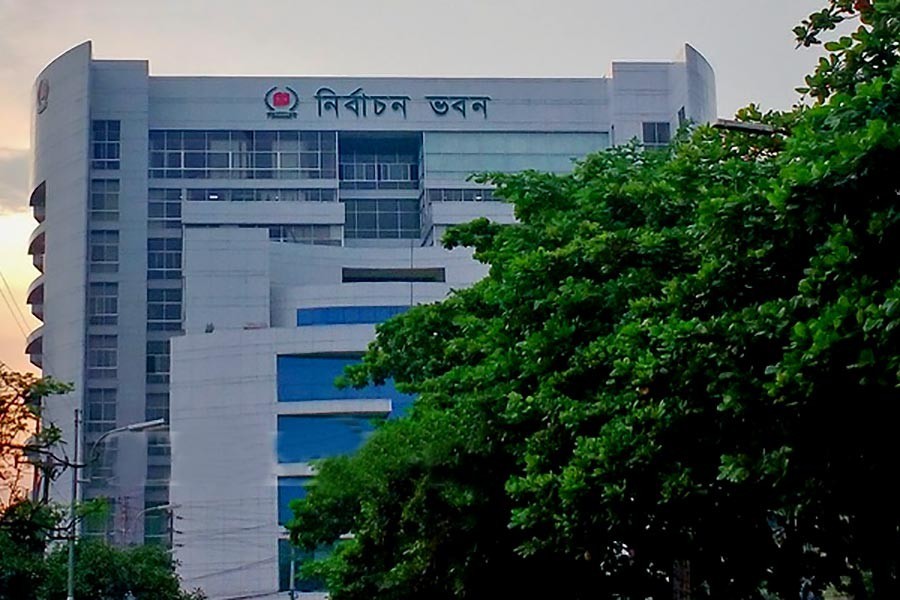The Election Commission has touched off a political debate with a sudden move to use electronic voting machines (EVMs) in the general election that is only a few months away.
The commission had used EVMs in local government polls on a limited scale but said it had no plan to use the machines in the parliamentary polls unless all the political parties agreed.
Now weeks before officially launching preparations for the next election, it has proposed a project for a large-scale use of EVMs.
It has also started discussing ways to amend the electoral law - the Representation of the People Order (RPO) – to use EVMs in big ballot.
The election commissioners sat to discuss the issue on Sunday and will resume talks on Thursday.
The BNP, a staunch critic of the use of EVMs, smells foul play in the EC’s move in the eleventh hour.
The EVMs will be used to rig vote on a massive scale, BNP Standing Committee Member Khandaker Mosharraf Hossain has claimed.
“We won’t accept any move to use EVMs in the 11th parliamentary election,” he said on Wednesday, urging the EC to not amend the RPO to use EVMs in national election.
The ruling Awami League has unsurprisingly welcomed the EC’s latest move - it has made no bones about its liking for EVMs.
The party’s General Secretary Obaidul Quader has also questioned the BNP’s objection to using EVMs.
The EC said it would be possible to use EVMs in 100 of the 300 parliamentary seats, according to Quader.
“We welcome the EC’s initiative,” he told a programme on Wednesday.
The ATM Shamsul Huda-led EC introduced EVMs in Bangladesh in the 2010 local government elections by using the machines made with the help of BUET.
It had said at the time that it would expand the use of EVMs as the machines would reduce cost and time of voting and counting.
But the subsequent commission headed by Kazi Rakibuddin Ahmad did not make much ground on the issue of EVMs. It also had a dispute with the BUET over the machines and their use stopped after 2013 as those went out of order.
After the commissioners led by KM Nurul Huda took charge, the EC resumed the use of EVMs and ‘digitised EVMs’ were made with the help of Bangladesh Machine Tools Factory (BMTF).
But, Election Commissioner Mahbub Talukdar said in November last year: “Old EVMs have been out of operation, but we will try out a few machines, which are still working, in Rangpur and some other city polls.”
“But the commission does not plan to use EVMs in the next parliamentary elections,” he had said.
“Currently we are not ready to use the EVMs. We want to ensure a fair election which is not possible with faulty machines,” he had added.
The EVMs used by the current EC in recent polls are better than the ones used beforehand, according to Prof Md Haider Ali, a member of the commission’s technical committee.
“This machine leaves no room for rigging. The ballot will be issued only after automatic verification ensuring the identity of the voter,” Prof Ali, who teaches computer science and engineering at Dhaka University, said in July this year.
“The voter can vote only after identification through fingerprints or NID,” he said.
On August 20, Election Commissioner Kabita Khanam told the media that they were “positively considering use of EVMs in parliamentary polls”, but amendments to the RPO were needed to use the machines in general elections.
She, however, left room for doubt.
“We will need to increase our capabilities if we want to get all the polling stations ready to use the EVMs. We will need efficient staff and to train the voters.
“The question of gaining the trust of the stakeholders also remains,” she had added.
Tk 40 billion scheme for 150,000 EVMs
After using EVMs in up to 10 centres in recent city corporation elections, the EC has now proposed a project for large-scale use at an estimated cost of around Tk 40 billion.
It plans to buy 150,000 EVMs under the scheme, proposed to run for five years.
The cost would include Tk 35.15 billion to buy the EVMs, Tk 50 million in campaign for EVMs, Tk 100 million for transport, Tk 500 million for software, and Tk 750 million for furniture.
The project proposal titled ‘purchase, maintenance and use of EVMs’ has been sent to Planning Commission for presentation at Project Evaluation Committee meeting.
“We hope it will be placed in the committee’s meeting next month,” Saiful Haque Chowdhury, senior assistant chief at the EC Secretariat, said.
The finance ministry has cleared the proposed manpower for the project, according to Saiful, bdnews24 reported.
The Planning Commission will send the proposal back with its observations to the EC for amendments, if needs be. It will then be placed at the Executive Committee of the National Economic Council (ECNEC) for final approval, according to officials.
The final decision on the use of EVMs in the coming parliamentary election hinges on the EC, Saiful said.


